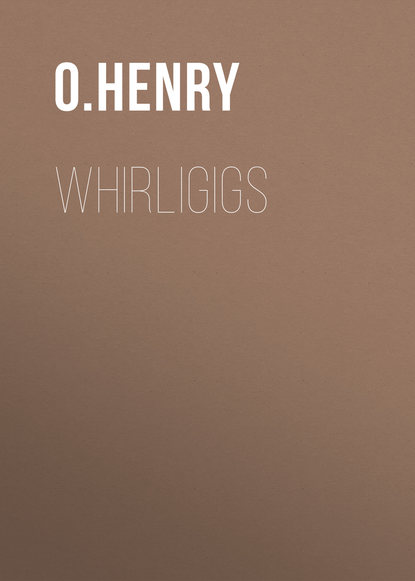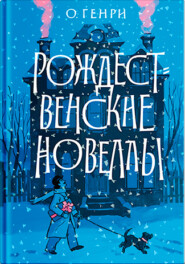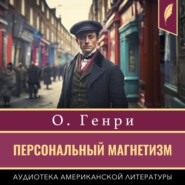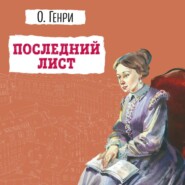По всем вопросам обращайтесь на: info@litportal.ru
(©) 2003-2024.
✖
Whirligigs
Настройки чтения
Размер шрифта
Высота строк
Поля
Miss Carroll ran forward, glowing and palpitating.
"Thank you, Jimmy, for the first good word I've had in many a day," she cried. And then she turned her eager face toward the desk.
"I'll show you, sergeant, whether I am to blame. I'll show them whether I can do that scene. Come, Mr. Delmars; let us begin. You will let us, won't you, sergeant?"
"How long will it take?" asked the sergeant, dubiously.
"Eight minutes," said the playwright. "The entire play consumes but thirty."
"You may go ahead," said the sergeant. "Most of you seem to side against the little lady. Maybe she had a right to crack up a saucer or two in that restaurant. We'll see how she does the turn before we take that up."
The matron of the police station had been standing near, listening to the singular argument. She came nigher and stood near the sergeant's chair. Two or three of the reserves strolled in, big and yawning.
"Before beginning the scene," said the playwright, "and assuming that you have not seen a production of 'A Gay Coquette,' I will make a brief but necessary explanation. It is a musical-farce-comedy – burlesque-comedietta. As the title implies, Miss Carroll's rôle is that of a gay, rollicking, mischievous, heartless coquette. She sustains that character throughout the entire comedy part of the production. And I have designed the extravaganza features so that she may preserve and present the same coquettish idea.
"Now, the scene in which we take exception to Miss Carroll's acting is called the 'gorilla dance.' She is costumed to represent a wood nymph, and there is a great song-and-dance scene with a gorilla – played by Mr. Delmars, the comedian. A tropical-forest stage is set.
"That used to get four and five recalls. The main thing was the acting and the dance – it was the funniest thing in New York for five months. Delmars's song, 'I'll Woo Thee to My Sylvan Home,' while he and Miss Carroll were cutting hide-and-seek capers among the tropical plants, was a winner."
"What's the trouble with the scene now?" asked the sergeant.
"Miss Carroll spoils it right in the middle of it," said the playwright wrathfully.
With a wide gesture of her ever-moving arms the actress waved back the little group of spectators, leaving a space in front of the desk for the scene of her vindication or fall. Then she whipped off her long tan cloak and tossed it across the arm of the policeman who still stood officially among them.
Miss Carroll had gone to supper well cloaked, but in the costume of the tropic wood nymph. A skirt of fern leaves touched her knee; she was like a humming-bird – green and golden and purple.
And then she danced a fluttering, fantastic dance, so agile and light and mazy in her steps that the other three members of the Carroll Comedy Company broke into applause at the art of it.
And at the proper time Delmars leaped out at her side, mimicking the uncouth, hideous bounds of the gorilla so funnily that the grizzled sergeant himself gave a short laugh like the closing of a padlock. They danced together the gorilla dance, and won a hand from all.
Then began the most fantastic part of the scene – the wooing of the nymph by the gorilla. It was a kind of dance itself – eccentric and prankish, with the nymph in coquettish and seductive retreat, followed by the gorilla as he sang "I'll Woo Thee to My Sylvan Home."
The song was a lyric of merit. The words were non-sense, as befitted the play, but the music was worthy of something better. Delmars struck into it in a rich tenor that owned a quality that shamed the flippant words.
During one verse of the song the wood nymph performed the grotesque evolutions designed for the scene. At the middle of the second verse she stood still, with a strange look on her face, seeming to gaze dreamily into the depths of the scenic forest. The gorilla's last leap had brought him to her feet, and there he knelt, holding her hand, until he had finished the haunting-lyric that was set in the absurd comedy like a diamond in a piece of putty.
When Delmars ceased Miss Carroll started, and covered a sudden flow of tears with both hands.
"There!" cried the playwright, gesticulating with violence; "there you have it, sergeant. For two weeks she has spoiled that scene in just that manner at every performance. I have begged her to consider that it is not Ophelia or Juliet that she is playing. Do you wonder now at our impatience? Tears for the gorilla song! The play is lost!"
Out of her bewitchment, whatever it was, the wood nymph flared suddenly, and pointed a desperate finger at Delmars.
"It is you – you who have done this," she cried wildly. "You never sang that song that way until lately. It is your doing."
"I give it up," said the sergeant.
And then the gray-haired matron of the police station came forward from behind the sergeant's chair.
"Must an old woman teach you all?" she said. She went up to Miss Carroll and took her hand.
"The man's wearing his heart out for you, my dear. Couldn't you tell it the first note you heard him sing? All of his monkey flip-flops wouldn't have kept it from me. Must you be deaf as well as blind? That's why you couldn't act your part, child. Do you love him or must he be a gorilla for the rest of his days?"
Miss Carroll whirled around and caught Delmars with a lightning glance of her eye. He came toward her, melancholy.
"Did you hear, Mr. Delmars?" she asked, with a catching breath.
"I did," said the comedian. "It is true. I didn't think there was any use. I tried to let you know with the song."
"Silly!" said the matron; "why didn't you speak?"
"No, no," cried the wood nymph, "his way was the best. I didn't know, but – it was just what I wanted, Bobby."
She sprang like a green grasshopper; and the comedian opened his arms, and – smiled.
"Get out of this," roared the desk sergeant to the waiting waiter from the restaurant. "There's nothing doing here for you."
XVII
ONE DOLLAR'S WORTH
The judge of the United States court of the district lying along the Rio Grande border found the following letter one morning in his mail:
JUDGE:
When you sent me up for four years you made a talk. Among other hard things, you called me a rattlesnake. Maybe I am one – anyhow, you hear me rattling now. One year after I got to the pen, my daughter died of – well, they said it was poverty and the disgrace together. You've got a daughter, Judge, and I'm going to make you know how it feels to lose one. And I'm going to bite that district attorney that spoke against me. I'm free now, and I guess I've turned to rattlesnake all right. I feel like one. I don't say much, but this is my rattle. Look out when I strike.
Yours respectfully,
RATTLESNAKE.
Judge Derwent threw the letter carelessly aside. It was nothing new to receive such epistles from desperate men whom he had been called upon to judge. He felt no alarm. Later on he showed the letter to Littlefield, the young district attorney, for Littlefield's name was included in the threat, and the judge was punctilious in matters between himself and his fellow men.
Littlefield honoured the rattle of the writer, as far as it concerned himself, with a smile of contempt; but he frowned a little over the reference to the Judge's daughter, for he and Nancy Derwent were to be married in the fall.
Littlefield went to the clerk of the court and looked over the records with him. They decided that the letter might have been sent by Mexico Sam, a half-breed border desperado who had been imprisoned for manslaughter four years before. Then official duties crowded the matter from his mind, and the rattle of the revengeful serpent was forgotten.
Court was in session at Brownsville. Most of the cases to be tried were charges of smuggling, counterfeiting, post-office robberies, and violations of Federal laws along the border. One case was that of a young Mexican, Rafael Ortiz, who had been rounded up by a clever deputy marshal in the act of passing a counterfeit silver dollar. He had been suspected of many such deviations from rectitude, but this was the first time that anything provable had been fixed upon him. Ortiz languished cozily in jail, smoking brown cigarettes and waiting for trial. Kilpatrick, the deputy, brought the counterfeit dollar and handed it to the district attorney in his office in the court-house. The deputy and a reputable druggist were prepared to swear that Ortiz paid for a bottle of medicine with it. The coin was a poor counterfeit, soft, dull-looking, and made principally of lead. It was the day before the morning on which the docket would reach the case of Ortiz, and the district attorney was preparing himself for trial.
"Not much need of having in high-priced experts to prove the coin's queer, is there, Kil?" smiled Littlefield, as he thumped the dollar down upon the table, where it fell with no more ring than would have come from a lump of putty.
"I guess the Greaser's as good as behind the bars," said the deputy, easing up his holsters. "You've got him dead. If it had been just one time, these Mexicans can't tell good money from bad; but this little yaller rascal belongs to a gang of counterfeiters, I know. This is the first time I've been able to catch him doing the trick. He's got a girl down there in them Mexican jacals on the river bank. I seen her one day when I was watching him. She's as pretty as a red heifer in a flower bed."
Littlefield shoved the counterfeit dollar into his pocket, and slipped his memoranda of the case into an envelope. Just then a bright, winsome face, as frank and jolly as a boy's, appeared in the doorway, and in walked Nancy Derwent.
"Oh, Bob, didn't court adjourn at twelve to-day until to-morrow?" she asked of Littlefield.
"It did," said the district attorney, "and I'm very glad of it. I've got a lot of rulings to look up, and – "
"Now, that's just like you. I wonder you and father don't turn to law books or rulings or something! I want you to take me out plover-shooting this afternoon. Long Prairie is just alive with them. Don't say no, please! I want to try my new twelve-bore hammerless. I've sent to the livery stable to engage Fly and Bess for the buckboard; they stand fire so nicely. I was sure you would go."
"Thank you, Jimmy, for the first good word I've had in many a day," she cried. And then she turned her eager face toward the desk.
"I'll show you, sergeant, whether I am to blame. I'll show them whether I can do that scene. Come, Mr. Delmars; let us begin. You will let us, won't you, sergeant?"
"How long will it take?" asked the sergeant, dubiously.
"Eight minutes," said the playwright. "The entire play consumes but thirty."
"You may go ahead," said the sergeant. "Most of you seem to side against the little lady. Maybe she had a right to crack up a saucer or two in that restaurant. We'll see how she does the turn before we take that up."
The matron of the police station had been standing near, listening to the singular argument. She came nigher and stood near the sergeant's chair. Two or three of the reserves strolled in, big and yawning.
"Before beginning the scene," said the playwright, "and assuming that you have not seen a production of 'A Gay Coquette,' I will make a brief but necessary explanation. It is a musical-farce-comedy – burlesque-comedietta. As the title implies, Miss Carroll's rôle is that of a gay, rollicking, mischievous, heartless coquette. She sustains that character throughout the entire comedy part of the production. And I have designed the extravaganza features so that she may preserve and present the same coquettish idea.
"Now, the scene in which we take exception to Miss Carroll's acting is called the 'gorilla dance.' She is costumed to represent a wood nymph, and there is a great song-and-dance scene with a gorilla – played by Mr. Delmars, the comedian. A tropical-forest stage is set.
"That used to get four and five recalls. The main thing was the acting and the dance – it was the funniest thing in New York for five months. Delmars's song, 'I'll Woo Thee to My Sylvan Home,' while he and Miss Carroll were cutting hide-and-seek capers among the tropical plants, was a winner."
"What's the trouble with the scene now?" asked the sergeant.
"Miss Carroll spoils it right in the middle of it," said the playwright wrathfully.
With a wide gesture of her ever-moving arms the actress waved back the little group of spectators, leaving a space in front of the desk for the scene of her vindication or fall. Then she whipped off her long tan cloak and tossed it across the arm of the policeman who still stood officially among them.
Miss Carroll had gone to supper well cloaked, but in the costume of the tropic wood nymph. A skirt of fern leaves touched her knee; she was like a humming-bird – green and golden and purple.
And then she danced a fluttering, fantastic dance, so agile and light and mazy in her steps that the other three members of the Carroll Comedy Company broke into applause at the art of it.
And at the proper time Delmars leaped out at her side, mimicking the uncouth, hideous bounds of the gorilla so funnily that the grizzled sergeant himself gave a short laugh like the closing of a padlock. They danced together the gorilla dance, and won a hand from all.
Then began the most fantastic part of the scene – the wooing of the nymph by the gorilla. It was a kind of dance itself – eccentric and prankish, with the nymph in coquettish and seductive retreat, followed by the gorilla as he sang "I'll Woo Thee to My Sylvan Home."
The song was a lyric of merit. The words were non-sense, as befitted the play, but the music was worthy of something better. Delmars struck into it in a rich tenor that owned a quality that shamed the flippant words.
During one verse of the song the wood nymph performed the grotesque evolutions designed for the scene. At the middle of the second verse she stood still, with a strange look on her face, seeming to gaze dreamily into the depths of the scenic forest. The gorilla's last leap had brought him to her feet, and there he knelt, holding her hand, until he had finished the haunting-lyric that was set in the absurd comedy like a diamond in a piece of putty.
When Delmars ceased Miss Carroll started, and covered a sudden flow of tears with both hands.
"There!" cried the playwright, gesticulating with violence; "there you have it, sergeant. For two weeks she has spoiled that scene in just that manner at every performance. I have begged her to consider that it is not Ophelia or Juliet that she is playing. Do you wonder now at our impatience? Tears for the gorilla song! The play is lost!"
Out of her bewitchment, whatever it was, the wood nymph flared suddenly, and pointed a desperate finger at Delmars.
"It is you – you who have done this," she cried wildly. "You never sang that song that way until lately. It is your doing."
"I give it up," said the sergeant.
And then the gray-haired matron of the police station came forward from behind the sergeant's chair.
"Must an old woman teach you all?" she said. She went up to Miss Carroll and took her hand.
"The man's wearing his heart out for you, my dear. Couldn't you tell it the first note you heard him sing? All of his monkey flip-flops wouldn't have kept it from me. Must you be deaf as well as blind? That's why you couldn't act your part, child. Do you love him or must he be a gorilla for the rest of his days?"
Miss Carroll whirled around and caught Delmars with a lightning glance of her eye. He came toward her, melancholy.
"Did you hear, Mr. Delmars?" she asked, with a catching breath.
"I did," said the comedian. "It is true. I didn't think there was any use. I tried to let you know with the song."
"Silly!" said the matron; "why didn't you speak?"
"No, no," cried the wood nymph, "his way was the best. I didn't know, but – it was just what I wanted, Bobby."
She sprang like a green grasshopper; and the comedian opened his arms, and – smiled.
"Get out of this," roared the desk sergeant to the waiting waiter from the restaurant. "There's nothing doing here for you."
XVII
ONE DOLLAR'S WORTH
The judge of the United States court of the district lying along the Rio Grande border found the following letter one morning in his mail:
JUDGE:
When you sent me up for four years you made a talk. Among other hard things, you called me a rattlesnake. Maybe I am one – anyhow, you hear me rattling now. One year after I got to the pen, my daughter died of – well, they said it was poverty and the disgrace together. You've got a daughter, Judge, and I'm going to make you know how it feels to lose one. And I'm going to bite that district attorney that spoke against me. I'm free now, and I guess I've turned to rattlesnake all right. I feel like one. I don't say much, but this is my rattle. Look out when I strike.
Yours respectfully,
RATTLESNAKE.
Judge Derwent threw the letter carelessly aside. It was nothing new to receive such epistles from desperate men whom he had been called upon to judge. He felt no alarm. Later on he showed the letter to Littlefield, the young district attorney, for Littlefield's name was included in the threat, and the judge was punctilious in matters between himself and his fellow men.
Littlefield honoured the rattle of the writer, as far as it concerned himself, with a smile of contempt; but he frowned a little over the reference to the Judge's daughter, for he and Nancy Derwent were to be married in the fall.
Littlefield went to the clerk of the court and looked over the records with him. They decided that the letter might have been sent by Mexico Sam, a half-breed border desperado who had been imprisoned for manslaughter four years before. Then official duties crowded the matter from his mind, and the rattle of the revengeful serpent was forgotten.
Court was in session at Brownsville. Most of the cases to be tried were charges of smuggling, counterfeiting, post-office robberies, and violations of Federal laws along the border. One case was that of a young Mexican, Rafael Ortiz, who had been rounded up by a clever deputy marshal in the act of passing a counterfeit silver dollar. He had been suspected of many such deviations from rectitude, but this was the first time that anything provable had been fixed upon him. Ortiz languished cozily in jail, smoking brown cigarettes and waiting for trial. Kilpatrick, the deputy, brought the counterfeit dollar and handed it to the district attorney in his office in the court-house. The deputy and a reputable druggist were prepared to swear that Ortiz paid for a bottle of medicine with it. The coin was a poor counterfeit, soft, dull-looking, and made principally of lead. It was the day before the morning on which the docket would reach the case of Ortiz, and the district attorney was preparing himself for trial.
"Not much need of having in high-priced experts to prove the coin's queer, is there, Kil?" smiled Littlefield, as he thumped the dollar down upon the table, where it fell with no more ring than would have come from a lump of putty.
"I guess the Greaser's as good as behind the bars," said the deputy, easing up his holsters. "You've got him dead. If it had been just one time, these Mexicans can't tell good money from bad; but this little yaller rascal belongs to a gang of counterfeiters, I know. This is the first time I've been able to catch him doing the trick. He's got a girl down there in them Mexican jacals on the river bank. I seen her one day when I was watching him. She's as pretty as a red heifer in a flower bed."
Littlefield shoved the counterfeit dollar into his pocket, and slipped his memoranda of the case into an envelope. Just then a bright, winsome face, as frank and jolly as a boy's, appeared in the doorway, and in walked Nancy Derwent.
"Oh, Bob, didn't court adjourn at twelve to-day until to-morrow?" she asked of Littlefield.
"It did," said the district attorney, "and I'm very glad of it. I've got a lot of rulings to look up, and – "
"Now, that's just like you. I wonder you and father don't turn to law books or rulings or something! I want you to take me out plover-shooting this afternoon. Long Prairie is just alive with them. Don't say no, please! I want to try my new twelve-bore hammerless. I've sent to the livery stable to engage Fly and Bess for the buckboard; they stand fire so nicely. I was sure you would go."

















